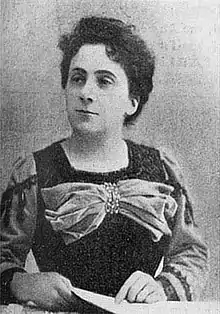Marie Léopold-Lacour
Marie Léopold-Lacour (née, Jourdan; also known as Mary Léopold Lacour; 6 January 1859 - 5 December 1942) was a French feminist activist, journalist, playwright, poet, and storyteller. She was a champion of mixed-gender schools. Lacour died in 1942.
Marie Leopold-Lacour | |
|---|---|
 | |
| Born | Marie-Rachel Jourdan 6 January 1859 Royan, France |
| Died | 5 December 1942 Neuilly-sur-Seine, France |
| Occupation |
|
| Language | French |
| Nationality | French |
| Genre |
|
Biography
Marie-Rachel Jourdan was born 6 January 1859, in Royan.[1][2] She contributed to feminist journals such as La Fronde,[3] founded by Marguerite Durand.
Wife of the feminist writer Léopold Lacour,[4] she shared his passion for mixed-gender education. She spoke at the International Congress of Women of 1896, in Paris, chaired by Marie Bonnevial, describing the state of mixed-gender schools in Europe,[5] and responding to the arguments of their opponents.[2]
In Literature (Harper and Brothers, 1898), Léopold-Lacour's name was included on a list of potential members if an Academy of Ladies was formed in Paris, several meetings already having been held to deliberate on the scheme.[6] She participated in the planning committee of the "Condition et Droits" Congress, September 1900.[7]
Mary Leopold-Lacour died 5 December 1942, in Neuilly-sur-Seine.[1]
Selected works
Opera libretto
- Vlasta, opera libretto, with Mrs. Paul Poirson[2]
- Sylvain et Gaël, comic opera libretto, with Mrs. Paul Poirson[2]
Pantomime
- L'Héritage de Pierrot, pantomime in 2 acts, performed in Paris, at the Théâtre de l'Application (Les Escholiers), 20 May 1892
- Le Rendez-vous ou Plus fort que la mort, pantomime, (Les Escholiers), c. 1895-1896
- Les Morts aimés, pantomime, (Les Escholiers) c. 1895-1896
- Nuit d'hyménée !, pantomime, (Les Escholiers), c. 1895-1896
- Don Juan aux enfers, ballet-pantomime in 1 act, music by Henri José, performed at the Casino de Paris, 29 November 1897
- La Chambre des aïeux, pantomime in 1 act, 10 scenes, published in Les Saisons, autumn 1921
Plays
- Un pauvre bûcheron, play in 1 act, published in La Pensée sur la Côte d'Azur, ca. 1923, and performed in Paris, at the Odéon-Théâtre de l'Europe, 20 December 1923
Sketches
- La Sérénade inutile, sketch published in La Pensée sur la Côte d'Azur, ca. 1929
Articles
- Mary Leopold Lacour, "Madame Gabrielle Réval", Femina, 1 October 1903, p. 685.[8]
References
- "GAIA 9 : moteur de recherche". consultation.archives.hauts-de-seine.net (in French). Retrieved 15 January 2022.
- Beach, Cecilia (1996). French Women Playwrights of the Twentieth Century: A Checklist. Greenwood Press. p. 240. ISBN 978-0-313-29175-3. Retrieved 15 January 2022.
- Damian-Gaillard, Béatrice (17 July 2015). Le journalisme au féminin: Assignations, inventions, stratégies (in French). Presses universitaires de Rennes. ISBN 978-2-7535-3904-4. Retrieved 15 January 2022.
- Margadant, Jo Burr (4 September 2000). The New Biography: Performing Femininity in Nineteenth-Century France. University of California Press. ISBN 978-0-520-22141-3. Retrieved 15 January 2022.
- Thébaud, Françoise; Zancarini-Fournel, Michelle (2003). Coéducation et mixité (in French). Presses Univ. du Mirail. ISBN 978-2-85816-706-7. Retrieved 15 January 2022.
- "There is talk in Paris". Literature. Vol. 2. Harper and Brothers. 1898. p. 461. Retrieved 15 January 2022.
- Offen, Karen (11 January 2018). "Condition et Droits Congress - 5-8 September 1900". Debating the Woman Question in the French Third Republic, 1870-1920. Cambridge University Press. ISBN 978-1-107-18804-4. Retrieved 15 January 2022.
- Mesch, Rachel (3 July 2013). "Notes to Chapter 2". Having It All in the Belle Epoque: How French Women's Magazines Invented the Modern Woman. Stanford University Press. p. 211. ISBN 978-0-8047-8713-0. Retrieved 15 January 2022.
External links
- "RAPPORT DE MME MARY LÉOPOLD-LACOUR, RAPPORTEUR, PREMIÈRE PARTIE, Historique et Tableau de la Coeducation a l'etranger et en France.", CONGRES INTERNATIONAL DE LA CONDITION & DES DROITS DES FEMMES. Tenu les 5, 6, 7 et 8 Septembre 1900. A L'EXPOSITION UNIVERSELLE, Au Palais de l'Economie sociale et des Congrès. (in French)